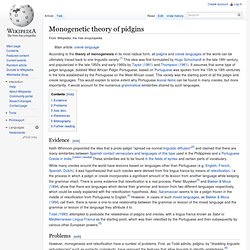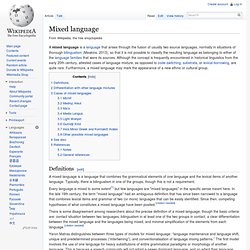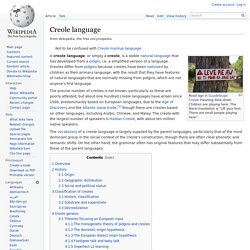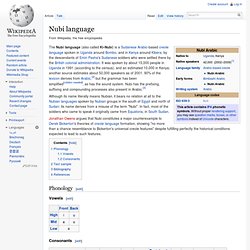

Salikoko Mufwene : Publications. Monogenetic theory of pidgins. According to the theory of monogenesis in its most radical form, all pidgins and creole languages of the world can be ultimately traced back to one linguistic variety.[1] This idea was first formulated by Hugo Schuchardt in the late 19th century and popularized in the late 1950s and early 1960s by Taylor (1961) and Thompson (1961).

It assumes that some type of pidgin language, dubbed West African Pidgin Portuguese, based on Portuguese was spoken from the 15th to 18th centuries in the forts established by the Portuguese on the West African coast. This variety was the starting point of all the pidgin and creole languages. This would explain to some extent why Portuguese lexical items can be found in many creoles, but more importantly, it would account for the numerous grammatical similarities shared by such languages.
Evidence[edit] While many creoles around the world have lexicons based on languages other than Portuguese (e.g. Problems[edit] See also[edit] Language bioprogram theory. Mixed language. A mixed language is a language that arises through the fusion of usually two source languages, normally in situations of thorough bilingualism (Meakins, 2013), so that it is not possible to classify the resulting language as belonging to either of the language families that were its sources.

Although the concept is frequently encountered in historical linguistics from the early 20th century, attested cases of language mixture, as opposed to code-switching, substrata, or lexical borrowing, are quite rare. Furthermore, a mixed language may mark the appearance of a new ethnic or cultural group. Definitions[edit] A mixed language is a language that combines the grammatical elements of one language and the lexical items of another language.
Typically, there is bilingualism in one of the groups, though this is not a requirement. Every language is mixed to some extent[1] but few languages are "mixed languages" in the specific sense meant here. Differentiation with other language mixtures[edit] Ma'a. Creole language. Road sign in Guadeloupe Creole meaning Slow down.

Children are playing here. The literal translation is "Lift your foot. There are small people playing here". A creole language, or simply a creole, is a stable natural language that has developed from a pidgin, i.e. a simplified version of a language. Creoles differ from pidgins because creoles have been nativized by children as their primary language, with the result that they have features of natural languages that are normally missing from pidgins, which are not anyone's first language.
The precise number of creoles is not known, particularly as these are poorly attested, but about one hundred creole languages have arisen since 1500, predominantly based on European languages, due to the Age of Discovery and the Atlantic slave trade,[1] though there are creoles based on other languages, including Arabic, Chinese, and Malay. Overview[edit] History[edit] Origin[edit] Geographic distribution[edit] Social and political status[edit] Nubi language. The Nubi language (also called Ki-Nubi) is a Sudanese Arabic-based creole language spoken in Uganda around Bombo, and in Kenya around Kibera, by the descendants of Emin Pasha's Sudanese soldiers who were settled there by the British colonial administration.

It was spoken by about 15,000 people in Uganda in 1991 (according to the census), and an estimated 10,000 in Kenya; another source estimates about 50,000 speakers as of 2001. 90% of the lexicon derives from Arabic,[2] but the grammar has been simplified[citation needed], as has the sound system. Nubi has the prefixing, suffixing and compounding processes also present in Arabic.[3] Although its name literally means Nubian, it bears no relation at all to the Nubian languages spoken by Nubian groups in the south of Egypt and north of Sudan; its name derives from a misuse of the term "Nubi". In fact, most of the soldiers who came to speak it originally came from Equatoria, in South Sudan. Phonology[edit] Vowels[edit] Consonants[edit]